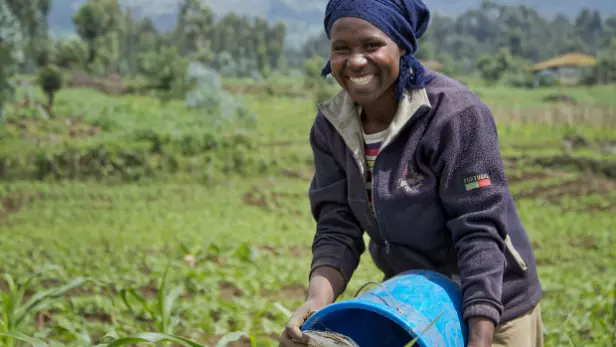Agriculture is the single-largest source of income for rural Africans and contributes to a quarter of the continent’s gross domestic product. The sector occupies more than 70 percent of the labor force in Africa’s low-income countries and contributes to food security and poverty reduction.
However, agriculture cannot meet its potential for growth if it does not increase in productivity and if the opportunities along value chains are not explored.
Africa is a youthful continent, but the region has by far the highest rate of working poverty, estimated at 40 percent in 2012. Working is a necessity for most young people. This growing youth population (60 percent of Africans are between 16-24 years of age) doesn’t see agriculture as a profitable opportunity, but rather, as subsistence farming or a dead end.
We see agriculture as an essential driver of economic development and an area of great opportunity for young people in Africa. To engage youth in agriculture, The MasterCard Foundation and SNV have partnered to facilitate access to secure jobs, financial services and skills for young people to grow their own businesses. We’re making the case for agriculture as a business that offers several pathways to steady employment or entrepreneurship.
SNV’s Opportunities for Youth Employment program aims to increase youth employment and income by building their skills and capacity and linking youth to market opportunities in growth sectors that have potential for job creation. OYE focuses on market opportunities and market skills demands. Subsequent steps such as skills development, on-the-job training and coaching towards employment or self-employment are done in close collaboration with private sector companies. The program recognizes that young people are not a homogeneous group and hence interventions are designed to suit young people’s unique needs, their local context and the markets within their reach.
In this five-year project, OYE aims to reach out to 20,500 rural out-of-school youth in Tanzania, Rwanda and Mozambique, providing them with appropriate skills and transitioning them into job and self-employment opportunities. During its first year, OYE has enrolled roughly 3,000 rural youth, 28 percent of whom are young women. Of this total, the vast majority have completed the basic technical, business and life skills training with high levels of motivation and employability. One local partner, Sustainable Agriculture Tanzania, is training young people in horticulture farming, marketing and agribusiness. Many of the young people are coming from Kaziwa village in Kiroka ward where they have grouped, trained and practiced their skills on a demonstration plot that grows tomatoes, onions and Chinese lettuce.
“We teach all the skills required to run a vegetable garden organically, including making organic fertilizer such as compost and techniques for pest control,” said Alex Wostry, project coordinator at SAT.
Organic agriculture is the appropriate model because of its low resource requirements, he added: “The good thing about organic farming is that you don’t need a big budget to get started. You can do a lot with a small amount of land, and you need less water than with chemical-reliant farming. So there’s less likelihood that young people will be unable to start because of start-up costs.”
Moshi Ahmad is the leader of the Kiroka farming group. Prior to the training, she was reliant on subsistence agriculture, primarily growing maize and rice.
“I have learned many things — to make compost, to prepare plots for planting, to measure properly so that seeds can grow well,” she said.
As group leader, Moshi is responsible for ensuring the group functions effectively — a role that provides her with a valuable sense of empowerment.
“When I ask people to do something and they do it, I feel very comfortable,” she said.
An increasing number of private sector companies are interested in this model. Whereas OYE provides youth with soft skills that serve and stimulate their interests and ambitions, more private sector companies provide on-the-job training to youth. In Tanzania and Mozambique, we are linking agribusinesses, including producers, buyers and processors, to rural youths who have the ambition to engage with these companies. During the past year, SNV reached agreements with more than five private businesses to take part in the OYE program as potential employers and mentors.
It is this holistic approach — one that provides technical, business, entrepreneurial, financial and life skills — that will change the perspective on agriculture in Africa from subsistence farming to economic prosperity and entrepreneurship.
(Source: https://www.devex.com/news/envisioning-agriculture-as-a-business-for-youth-in-africa-85728 )




No comments yet, be the first to leave one!
You must be logged in to post a comment.